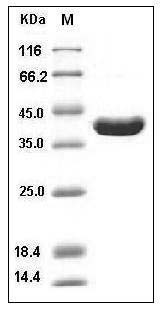-
Product Name
Human ITCH/AIP4 (aa 526-903) recombinant protein
- Documents
-
Description
Acts as an E3 ubiquitin-protein ligase which accepts ubiquitin from an E2 ubiquitin-conjugating enzyme in the form of a thioester and then directly transfers the ubiquitin to targeted substrates. It catalyzes 'Lys-29'-, 'Lys-48'- and 'Lys-63'-linked ubiquitin conjugation. It is involved in the control of inflammatory signaling pathways. Is an essential component of a ubiquitin-editing protein complex, comprising also TNFAIP3, TAX1BP1 and RNF11, that ensures the transient nature of inflammatory signaling pathways. Promotes the association of the complex after TNF stimulation. Once the complex is formed, TNFAIP3 deubiquitinates 'Lys-63' polyubiquitin chains on RIPK1 and catalyzes the formation of 'Lys-48'-polyubiquitin chains. This leads to RIPK1 proteasomal degradation and consequently termination of the TNF- or LPS-mediated activation of NFKB1. Ubiquitinates RIPK2 by 'Lys-63'-linked conjugation and influences NOD2-dependent signal transduction pathways. Regulates the transcriptional activity of several transcription factors, and probably plays an important role in the regulation of immune response. Ubiquitinates NFE2 by 'Lys-63' linkages and is implicated in the control of the development of hematopoietic lineages. Critical regulator of T-helper (TH2) cytokine development through its ability to induce JUNB ubiquitination and degradation (By similarity). Ubiquitinates SNX9. Ubiquitinates CXCR4 and HGS/HRS and regulates sorting of CXCR4 to the degradative pathway. It is involved in the negative regulation of MAVS-dependent cellular antiviral responses. Ubiquitinates MAVS through 'Lys-48'-linked conjugation resulting in MAVS proteasomal degradation. Involved in the regulation of apoptosis and reactive oxygen species levels through the ubiquitination and proteasomal degradation of TXNIP. Mediates the antiapoptotic activity of epidermal growth factor through the ubiquitination and proteasomal degradation of p15 BID. Targets DTX1 for lysosomal degradation and controls NOTCH1 degradation, in the absence of ligand, through 'Lys-29'-linked polyubiquitination.
-
Protein name
E3 ubiquitin-protein ligase Itchy homolog
-
Protein short names
ITCH; 6720481N21RIK; KIAA4011; AIF4; 8030492O04RIK; C230047C07RIK; ADMFD; NAPP1; A130065M08; DJ468O1.1; RP23-87L24.1; AIP4; MKIAA4011
-
Uniprot ID
Q96J02
-
Gene Name
ITCH
-
Source/Expression Host
E. coli
-
Expression Plasmid/cDNA
A DNA sequence encoding the human ITCH (NP_113671.3) N-terminal segment (Arg 526-Glu 903) was expressed and purified, with two additional amino acids (Gly & Pro) at the N-terminus.
-
Protein Species
Human
-
Molecular weight
The recombinant human ITCH (aa 526-903) consisting of 380 amino acids and has a calculated molecular mass of 40 kDa. as estimated in SDS-PAGE under reducing conditions.
-
Purity
> 98 % as determined by SDS-PAGE
-
Validations

Human ITCH / AIP4 Protein (aa 526-903) SDS-PAGE
Related Products / Services
Please note: All products are "FOR RESEARCH USE ONLY AND ARE NOT INTENDED FOR DIAGNOSTIC OR THERAPEUTIC USE"
